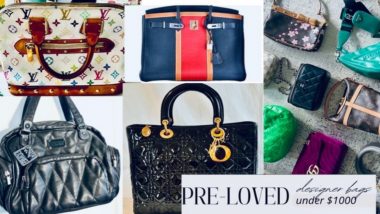In 2025, opting for second-hand designer bags has become a wise and compassionate choice. From renowned celebrities to everyday fashion enthusiasts, people are increasingly turning to pre-loved luxury bags, which not only come at a more realistic price but also reflect a genuine ethical commitment. In various podcasts worldwide, industry experts have openly shared their preference for buying pre-loved bags, highlighting the positive impact of these choices on both personal values and the larger community. Sneaker Trends You Can Expect To See Everywhere in 2025.
A notable revelation from a recent Business Insider article on July 3, 2024, has brought to light some troubling practices within two prominent Italian luxury brands. An investigation conducted by Italian prosecutors in Milan has uncovered the shocking low production costs of handbags that are sold for thousands of dollars, with particular focus on the subcontractors associated with LVMH's subsidiary, Dior.
Documents from the investigation reveal a troubling reality: Dior paid just $57 (about Rs. 4,870) for bags that retail for around $2,780 (roughly Rs. 2,37,553). This amount does not even factor in the cost of raw materials, such as leather. Prosecutors have highlighted a failure on the part of Dior to verify the working conditions or capabilities of its contractors, raising alarm bells about the ethical integrity of their supply chain. From Robot Baby by Schiaparelli to B-Girl Raygun’s Olympic Performance, a Look Back at the Year 2024 in Micro News.
As investigators delved deeper, they found evidence of distressing conditions where workers were forced to stay overnight at production facilities to meet demands. Electricity consumption patterns indicated operations were running continuously, even during holidays. Many of these subcontractors, primarily Chinese-owned firms, were employing workers under precarious circumstances, with some lacking proper documentation. Jane Birkin and Her Multifaceted Relationship With the Luxury Brand Hermès.
Furthermore, the investigation revealed a disregard for safety, with critical safety devices removed from glueing and brushing machines, prioritizing speed over worker welfare. Despite the gravity of these findings, LVMH has yet to issue a statement. Court documents suggest that Dior attempted to highlight previous supply-chain improvements in a memo reported by The Wall Street Journal.
This scrutiny extends beyond Dior, as Giorgio Armani also faces serious allegations of insufficient oversight of its suppliers. According to documents reviewed by Reuters,
Armani paid contractors just $99 per bag for products that sold for over $1,900 in stores. Unfortunately, the company has not provided a comment on these serious accusations.
Judges in Milan have mandated that both companies face judicial administration for one year, allowing them to continue operations during this period. The prosecution has noted that violating labor regulations appears to be a regrettable, widespread practice within the luxury industry, with luxury giants consistently benefiting at the expense of ethical standards.
Fabio Roia, the president of the Milan Court, expressed deep concern regarding the treatment of workers, emphasizing the pressing need for compliance with labor laws—particularly concerning health, safety, hours, and fair pay. He also pointed out the broader issue of unfair competition pushing responsible businesses out of the market.
In the previous year, LVMH reported having 2,062 suppliers and subcontractors, with 1,725 audits conducted, according to their environmental and social responsibility report. In light of these revelations, it's important for us to reflect on our consumer choices. LVMH CEO Bernard Arnault, one of the world’s wealthiest individuals, and his daughter, Delphine Arnault, CEO of Dior, hold immense influence.
If we truly care about our planet, labor rights, and ethical practices in the fashion industry, then embracing pre-loved pieces with emotional value can be a powerful stand against exploitation and overwhelming profit margins. Choosing to cherish and adopt someone else’s luxury item not only empowers us but also expresses our commitment to sustainability and social responsibility.
(The above story first appeared on LatestLY on Dec 31, 2024 12:02 PM IST. For more news and updates on politics, world, sports, entertainment and lifestyle, log on to our website latestly.com).













 Quickly
Quickly


